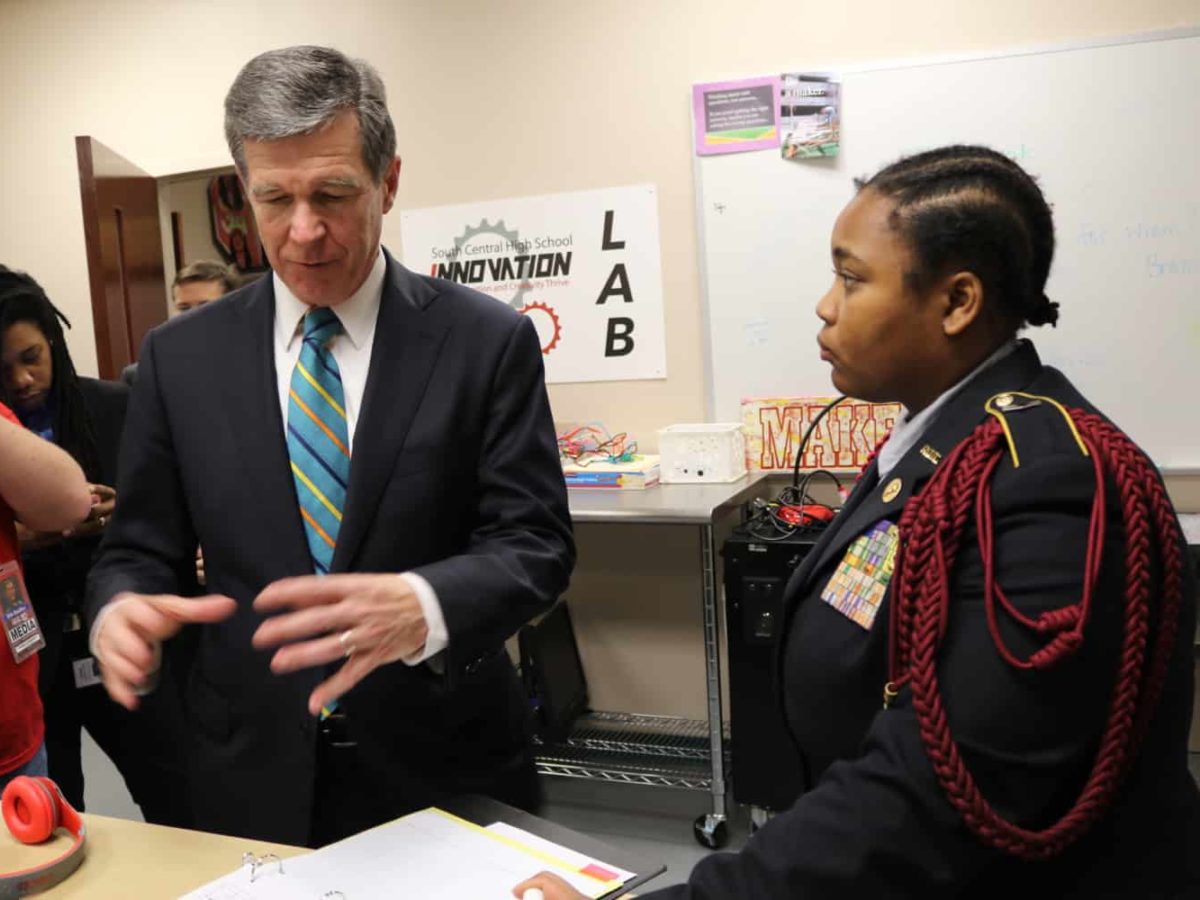

The budget impasse between Democratic Gov. Roy Cooper and legislative Republican leaders shows no sign of resolution. In fact, it may be ramping up. On Thursday Cooper visited St. Pauls Elementary in Robeson County to talk about school construction and the delay in passing a budget.
Meanwhile, also on Thursday, House Speaker Tim Moore, R-Cleveland, and others visited Rosewood Middle School in Goldsboro, also to talk about school construction and the budget.
Initially, Cooper’s plan for school construction was more in line with Republicans in the House. They both wanted a school construction building bond.
The Senate, on the other hand, wanted to do a pay-as-you-go plan, and ultimately, the Senate’s idea won the day in the final budget that passed the General Assembly. The plan commits about $4.4 billion over 10 years for K-12 school construction and repair. Of that, $1.5 billion will come from the State Capital and Infrastructure Fund, $1 billion from the Public School Capital Fund, and $1.9 billion in needs-based capital funding.
School construction is one of the sticking points that led the governor to veto the budget, according to Cooper. Legislative Republicans say that’s disingenuous and Cooper’s real problem is the lack of Medicaid expansion in the budget.
Whatever the case, we’ve been in a stalemate ever since.
But Thursday’s events illustrate something that’s worth noticing: education as political prop.
Every year, politicians talk a lot about education. But the topic is often used as a hammer to beat their opponent. And that’s a bipartisan tactic. Elected officials know that schools are a deep and emotional topic for voters, and using education issues as points of criticism is sure to rouse the ire of voters.
The examples of last Thursday are simply the most transparent. At this point, there isn’t much more to say about the school construction issue that hasn’t been said. But by visiting schools and showing how school construction needs impact matters on the ground, officials can point at their opponent and place blame for the lack of a budget.
The funny thing in this case is that representatives of both parties chose the same tactic on the same day, highlighting not just the dual nature of rhetoric, but also the two sides to blame. When two people, doing the same thing, point from different sides of the state at each other and level the same accusations, they might as well be pointing at themselves.
New testing on its way?
North Carolina is one of two states that has been chosen to pilot a new form of assessment. It’s a five-year pilot, and as part of it, North Carolina is going to replace the end-of-grade tests given students in grades 3-8 in reading and math with three tests given throughout the year. The first two will be formative, meaning they can be used to adjust and improve instruction, while the third will be summative, which basically means that the test will be used to show what students have learned.
It is a project remarkably similar to the NC check-ins, rolled out by the State Department of Public Instruction in some districts and placed inside a legislative bill that was meant to reduce testing in the state.
That bill attempted to get rid of a lot of the standardized tests that students take. It was originally two different bills with competing visions of testing reduction from the House and the Senate. The House, however, ultimately took the Senate’s bill and combined it with certain aspects of its own.
One of those pieces was a provision that would replace end-of-grade tests in grades K-8 with the check-ins. When the bill made its way back over to the Senate, that particular provision doomed it.
“Only the House could take a reduction-in-testing bill and add testing to the bill,” said Sen. Jerry Tillman, R-Randolph. His argument was that replacing one test with three amounted to more, not fewer tests, even if those tests were shorter and lower stakes. The Senate voted against concurring on the bill, and it’s now in negotiation in a conference committee.
Given the extreme distaste the plan faced in the Senate, it will be interesting to see what legislators make of this new pilot.
Correction: This article originally gave an incorrect home county for Speaker Tim Moore. It has been corrected.


